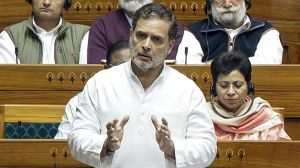‘Digital arrest’ scams: Supreme Court asks Centre to decide on ratifying UN cybercrime treaty, warns of ‘unusual orders’
The Supreme Court had earlier proposed transferring all 'digital arrest' cases from various states to the CBI and sought details of cases registered in their jurisdictions.
 The bench, meanwhile, in an extraordinary order directed that the accused in a 'digital arrest' case in which a 72-year-old woman lawyer was duped of Rs 3.29 crore should not be given bail till the investigation is complete. (File Photo)
The bench, meanwhile, in an extraordinary order directed that the accused in a 'digital arrest' case in which a 72-year-old woman lawyer was duped of Rs 3.29 crore should not be given bail till the investigation is complete. (File Photo)Underlining the importance of international cooperation in combating cybercrimes, the Supreme Court Monday asked the Centre to take a call on ratifying the United Nations Convention against Cybercrime.
Justice Joymalya Bagchi, who was part of a two-judge bench hearing a suo motu case concerning a ‘digital arrest’ fraud, asked Solicitor General Tushar Mehta, “To the best of our knowledge, there is a United Nations resolution – the UN Convention against Cybercrime – has our country ratified it?”
When informed that the country was yet to ratify the same, Justice Bagchi said, “Mr Solicitor, please look into that because without the collective efforts from all the law enforcement agencies across the world, we will never be able to (check cybercrimes)…That is one of the important and prime needs to track the moneytrail…”
The bench, meanwhile, in an extraordinary order directed that the accused in a ‘digital arrest’ case in which a 72-year-old woman lawyer was duped of Rs 3.29 crore should not be given bail till the investigation is complete.
“The accused shall not be released on bail by any court till the investigation is taken to a logical conclusion,” the bench directed after Advocate Vipin Nair, appearing on behalf of the Supreme Court Advocate on Records Association (SCAORA), pointed out that the accused are likely to be released soon as the 90-day period for filing chargesheet is coming to an end soon.
After pronouncing the order, Justice Kant said, “This matter may require some unusual orders.”
Agreeing, SG Mehta said, “This is an unusual phenomenon, needs unusual intervention.”
Taking suo motu cognisance of a complaint by a senior citizen couple from Ambala in Haryana, the Supreme Court on October 17 sought the response of the Ministry of Home Affairs (MHA) and the Central Bureau of Investigation (CBI) in the matter.
The couple had complained that they were defrauded of Rs 1.05 crore by digital arrest fraudsters who allegedly threatened them with forged orders of the Supreme Court, Bombay High Court and Enforcement Directorate (ED).
The Supreme Court then proposed transferring all such ‘digital arrest’ cases from the different states to the CBI and asked them to submit details of such cases registered in their respective jurisdictions.
Citing a “colossal increase in incidents of cyber frauds” across the country, the SCAORA also subsequently moved an application before the court, seeking to be made a party and to be allowed to assist it in the matter.
- 01
- 02
- 03
- 04
- 05































